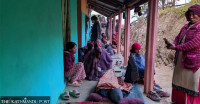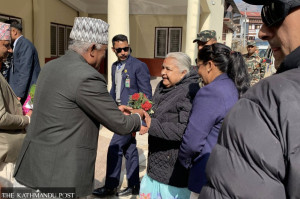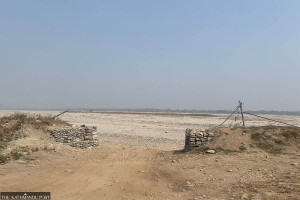Koshi Province
Drive to reduce home births in eastern rural districts receives mixed results
The award-winning Yaku Health Post is noted in the district for its exemplary service, with its provision of skilled manpower, infrastructure, and a quick, hands-on service.Alisha Shrestha
The ongoing campaigns to alleviate home births in several districts have returned mixed results. Some have achieved remarkable results, like Ward No. 5 of Arun Rural Municipality, while others still reel under lack of health posts with proper infrastructure, equipment, and in the case of many rural districts—the distance.
Ward No. 5 of Arun Rural Municipality was declared “fully institutionalised birth area” this week—after all the pregnant women in the area visited the health post to give birth in the last fiscal year—a first in the whole of Province 1.
During the fiscal year 2075/76, all the 61 pregnant women gave birth in the health post, said Bhojraj Bhandari, health assistant at Yaku Health Post.
Gajendra Bahadur Karki, chief of the ward, said that this is a special achievement of the ward.
“We are concerned about the health of mothers and their children,” Karki said. “We will introduce new plans and policies towards that goal in the future.”
The ward has already introduced a scheme to provide a rooster, rice, and jwano (carom seeds) herb, among others, to postpartum mothers.
The award-winning Yaku Health Post is noted in the district for its exemplary service, with its provision of skilled manpower, infrastructure, and a quick, hands-on service.
The health post not only provides service to the people in the ward but also to people from other neighbouring wards.
“We have managed all the necessary equipment to take care of patients, and, of course, a skilled set of manpower to use them,” said Dhyan Bahadur Rai, chief of the health post management committee. “That’s why it’s popular in the district.”
However, many wards across the country, like Hariharpurgadhi Rural Municipality-1, in Sindhuli district, Province 3, fall back in terms of maternal health.
A year ago, Saili Maya Tamang of the ward died the day she gave birth as there was no birthing centre in the ward’s health post. Her baby did not survive either.
In the past five years, five women who gave birth in their own homes in the ward have died, according to Kham Raj BK, in-charge of the health post.
BK, who said he has known of two deaths since he was posted in the health post two years ago, said the women died due to excessive bleeding and other minor complication during childbirth.
“Some villages are as far away as nine-hour walk from the health post,” BK said, lamenting a dismal visiting rate. Only 5 percent of the total pregnant women visit health post to give birth in the ward.
“Even though we don’t have a birthing centre in the health post, the complication could have been solved when the pregnant women brought to the health post,” he said.




 21.24°C Kathmandu
21.24°C Kathmandu











